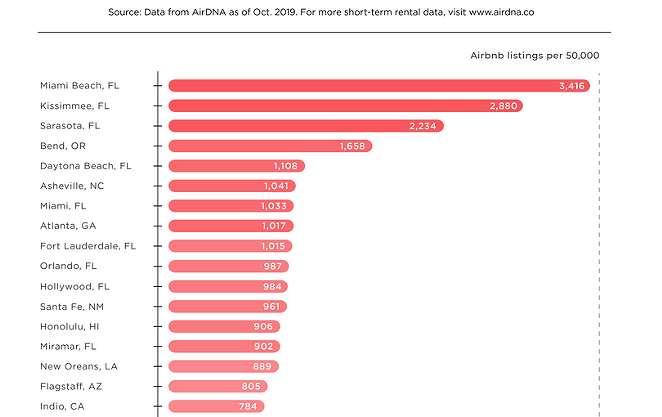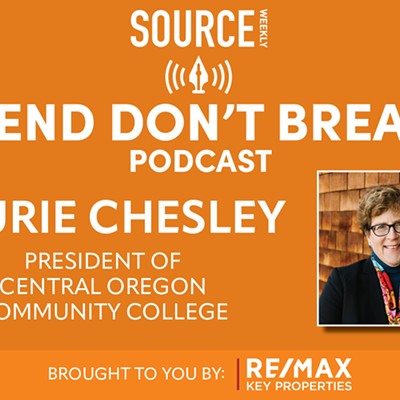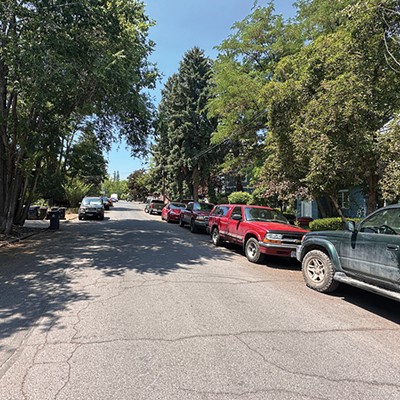The chief underlying cause (of the housing shortage) is the ongoing low levels of new construction this decade. On a population growth-adjusted basis, Oregon built fewer new housing units this decade than we have since at least World War II. —Josh Lehner, Economist, Oregon Office of Economic Analysis
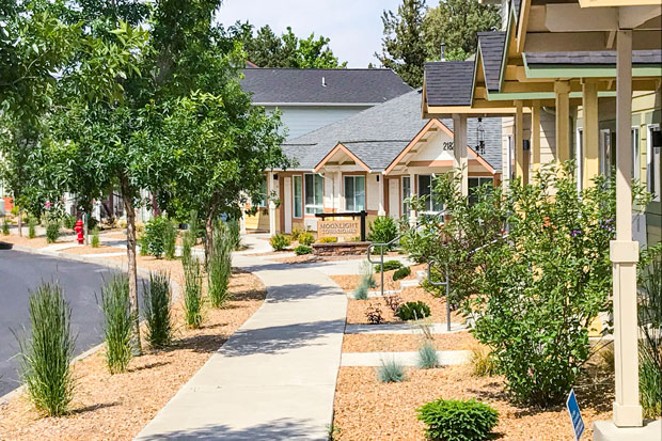
The affordable housing crisis in Central Oregon is getting worse. As the City of Bend, Deschutes County and the state government scramble to respond, market forces including construction costs, the expense of available land and the influence of out-of-state investors are driving up rents and home prices. Even people with relative affluence can't find a place to live.
Developers cite system development charges and even the City of Bend's affordable housing fees as barriers to building. But without these revenues, the City is left with little cash to subsidize low-income and workforce housing, and could be left paying part of the bill for the infrastructure needs of new development.
It's a balancing act the City has be struggling with for decades: finding the right mix of regulation and taxation combined with enough incentives and breaks to encourage housing production to meet the needs of the fastest-growing city on the West coast.
Is the City doing enough to mitigate the affordable housing crisis? The Source makes the rounds with city leaders, planners and people in the affordable housing community to take stock of the progress and highlight areas where local leaders could do more.
First Response
Bend was the first city in the state to charge a tax on the value of building permits to fund affordable housing, beginning in 2006. This "construction excise tax" is one-third of 1% on new residential, commercial or industrial projects. For example, if someone applies for a permit to install a water heater valued at $1000, they pay $3.33 into the affordable housing fund.
The fund has brought in about $7 million, which the City has leveraged into many millions more in state and federal funding and private investments in order to build 770 affordable housing units. Affordable housing is defined as homes or apartments for renters making 60% of the area median income ($63,468 in 2018, according to the U.S. Census Bureau) or less, and potential homebuyers making 80% of the AMI or less. The fund can also go towards improvements for homeless shelters. Some examples of projects include the Putnam Pointe Apartments above the Bend Visitor Center, Discovery Park Lodge in NorthWest Crossing and Moonlight Townhomes in northeast Bend.
Home prices outpaced wage growth over the last three decades. For example, from 1985 to 2016, average home prices in Bend increased by 277%, while average earnings per job grew by 24%.—2019 Central Oregon Regional Housing Needs Analysis
tweet this
The City has also received $6 million through federal block grants for affordable housing projects, funding 366 houses and apartments located throughout the city. In recent years, the Affordable Housing Committee—a volunteer task force of builders, real estate agents and housing advocates—has had a combined budget of around $1.5 million a year.
Lynne McConnell, the City of Bend's affordable housing manager, believes the Bend is "ahead of the curve" in terms of creating policy to promote affordable housing.
"We have passed more policy in this regard than anyone else except maybe Portland," McConnell said. "We're regularly updating our code to remove barriers."
The current shortfall for affordable rental units for households with incomes under $25,000 in Deschutes County is 6,100 units, according to the 2019 Central Oregon Regional Housing Needs Assessment. More than half of renters in Deschutes County spend more than 30% of their income on housing, as do 30% of homeowners in the region, according to the same report.
"Home prices outpaced wage growth over the last three decades," the RHNA report says. "For example, from 1985 to 2016, average home prices in Bend increased by 277%, while average earnings per job grew by 24%."
If Bend is leading the state in terms of policy changes, it lags behind Portland, Hood River, Corvallis, Cannon Beach, Newport and Milwaukie in terms of raising more funds for affordable housing projects based on the percentage of tax it collects from new building permits. When the state legislature passed SB 1533 in 2016, it allowed cities to levy a 1% construction excise tax on residential property development, and even more on commercial and industrial development. But, Bend stayed at one-third of 1% for both. Why?
"Bend has historically put a lot of the cost of infrastructure on developer's backs, which is why things aren't getting built as quickly as we need them, because there's no way to pencil some of these projects... City Council doesn't want to add more cost to residential development," McConnell told the Source.
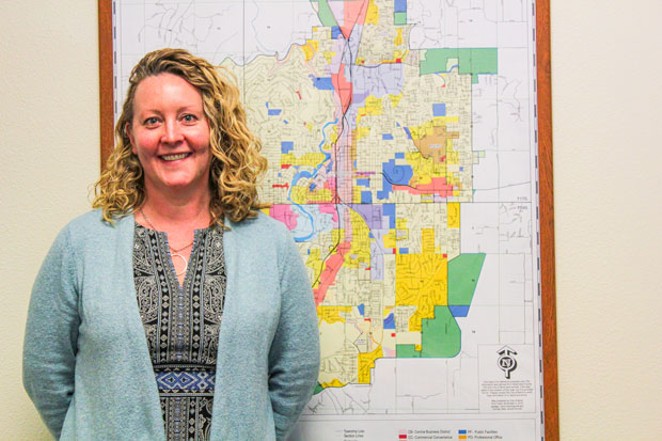
Bend City Councilor Justin Livingston—a realtor who served on the Affordable Housing Committee for two years before getting elected to City Council—doesn't believe more taxes are the way to go.
"I don't support raising (the affordable housing fee), because realistically there is not enough money to subsidize our way out of the housing crisis, and the way the new law is written, some of the money would go to the state and we just need more flexibility than that," Livingston said. "If you look at the housing needs analysis from five years ago and compare it to now, it hasn't gotten any better. We have to subsidize by design."
Livingston listed a number of code developments happening at the city level he believes will encourage more affordable housing development.
Code Improvements
For one, the City revised the "cottage cluster" code in 2019, Livingston said. That allows houses 1200 square feet or smaller to be grouped together around open spaces on smaller lots, according to Bend Senior Code Planner Pauline Hardie.
This change allowed Jesse Russell of Tongue & Groove Tiny Homes to build "The Hiatus," a cottage community of 22 separate small homes under 500 square feet each, clustered around small water features, trees and common paths. The neighborhood is currently under construction in southwest Bend, off Wizard Lane.

Hardie is working with a team to further the possibilities for small homes, but doesn't think a community of tiny homes on wheels is currently possible due to state RV restrictions.
Another recent change Livingston highlighted was an adjustment to how system development charges are calculated for new developments. The city surveyed 55 builders and developers to try to understand what was preventing the construction of more homes. One of the top concerns cited was the off-site transportation improvement costs sometimes tacked onto SDCs.
In the past, huge charges could end up falling on to one developer to build an entire roundabout, for example, because the projected traffic impact of the new residents tipped the scales and triggered a need for improvement of nearby intersections. Now, the City has both loosened the traffic limitations, and has a plan to make sure that future infrastructure improvements are sequenced to align with upcoming housing developments. This will further ease the tax burden on builders. Building on this effort toward efficiency, the city is also updating its construction permitting software to help make the process easier for developers.
Market Solutions
City Manager Eric King also supports the idea that encouraging private housing development is one of the most proactive steps the city can take. Builders said construction costs were the number-one barrier to new development, and because the City doesn't have more funds for building subsidies, another way forward is to listen to needs of the building community and adjust accordingly.
"I think we want to continue to use this mechanism and ask, what's not working?" King noted, in reference to the city's survey project, at the January 15 Council meeting. "Let's keep having open conversations on both sides, that's when we see the municipality and the private sector working in partnership, that's when we produce good things. We have to create a culture of openness to be able to (continue to support new housing construction)... but also we have to look at how the community is accepting all this growth and keep those things in balance."
King also reported on the City Council's goal to permit 3,000 new housing units by June of 2021. He said 2265 units are occupied or in progress, and he envisions the city will surpass its target.
Help from the state and county
Affordable and available housing is not just a crisis for Bend's working class. The "missing middle,"—or people that make between 80% and 140% of the Area Median Income—have been increasingly squeezed out of the market by out-of-state buyers and vacation rentals.
The Oregon State Legislature passed HB 2001 in 2019 to address the middle-class housing issue. It requires cities to allow two-, three- and four-unit residential buildings in areas zoned for single-family homes, something Bend already had in the works. Duplexes are currently allowed, and triplexes and quadplexes are in the planning stages, according to McConnell. The city also streamlined the permitting process for accessory dwelling units in 2016.
Rep. Cheri Helt (R-Bend) said affordable housing was one of her biggest priorities this year. She introduced HB 3450 to the Oregon Legislature to allow mixed use development in the Bend Central District.
"There are a lot of old car dealership buildings on Third Street that were designated as employment use only, and so I wrote this bill as part of a pilot program," Helt said. "Some of the bigger lots will have room for green space and can be created in a livable, walkable way. It passed almost unanimously."
Helt also co-sponsored HB 2336 with Rep. Jack Zika (R-Redmond) that allowed Redmond to expand its urban growth boundary for a 485-unit affordable housing development that will be built on land donated by Deschutes County.
South of Bend, managers at Sunriver Resort want to build housing for their employees near the Sunriver Brewing Company production facility. The plan is to construct small apartments or dorms to help accommodate the more than 500 people the resort hires every summer. The Deschutes County Planning Commission didn't approve the zone change the resort requested because they had concerns about parking, according to Tanya Saltzman, an associate planner for Deschutes County. She said the commission was also concerned about the new development remaining employee housing in the future. The Deschutes County Board of Commissioners will review the code change again at the end of the month. Saltzman believes the board will eventually support the housing, with some tweaks.
The Future
Dorms or "single room occupancy" dwellings could also be coming to Bend. Senior Planner Hardie has been working with architects, planning commissioners, neighborhood associations and city leaders to vet many creative housing solutions that became possible under HB 2001. She's been collecting designs and code changes from other cities with SROs including Portland, Seattle and Napa, California.
During the 19th century, between one-third and one-half of urban residents lived in hotels at some point in their lives, according to the Boston Globe. While some were simple boarding houses for day laborers—providing three meals a day and housekeeping services—others offered lavish dining rooms and opulent living areas.

Meanwhile, both McConnell and King also said that the prospective passage of Bend's May transportation bond could also help pave the way to future development.
While the City is responding to the affordable housing crisis by trying to ease the burdens on builders and change city codes, no one I spoke with seemed interested in raising the construction excise tax to 1%—a move that could potentially bring in an additional $2 million for affordable housing in Bend. Neither was there any talk of creating mandatory "inclusionary zoning" as Portland has done, as a result of HB 1533, that would require a certain number of affordable housing units in larger new developments.
"Bend has a very low tax rate compared to other cities," McConnell said. "People work really hard; it has to run a lean operation. It runs like a business. We just don't have the capacity to build housing."
Vacation Rental Impact
According the RHNA report from 2019, 15% of housing units in Deschutes County are vacant but not for sale or for rent. These could be second homes, full-time vacation rentals and investment properties. According to a 2019 study by IPX1031 (a company dedicated to helping people avoid paying capital gains taxes when they sell real estate) Bend has the fourth-highest per capita vacation rental listings in the U.S.
The Source dug into the data which revealed that IPX1031 had included Sunriver in its calculations. Using the same database and excluding Sunriver, Bend currently has 1,411 active rentals on Airbnb and VRBO.
As of November, the city was collecting transient room tax on 965 properties. While there is likely some discrepancy in the numbers due to property owners having separate listings for separate bedrooms in their homes, data from AirDNA noted that 85% of the listings in Bend were for an entire home. Hundreds of these properties are located in close-in, residential neighborhoods. They were once used as middle-income housing and long-term rentals for people who lived and worked in Bend full time. Today, some of these property owners have not only taken these houses out of the long-term rental pool, but they may also fail to pay their transient room tax—which helps the city pay for roads and other services that their guests use. (As part of this series on the housing crisis, the Source will post another article about what other cities are doing to reverse the damage of short-term rentals on affordable housing.)
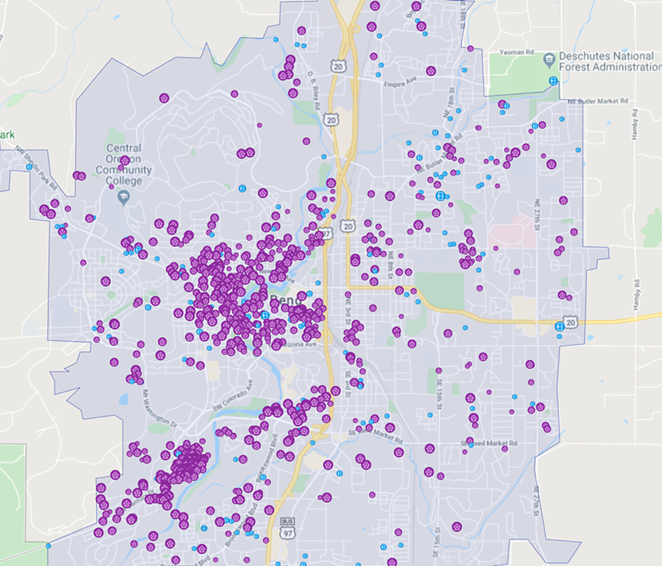
Real Estate Investments
The story is a familiar one in Bend: rich out-of-towners buy up property as investments, pricing out people who already live and work in the city. Luxury real estate construction drives up the cost of land and resources in order to build houses that may sit vacant for most of the year. Real estate brokers and developers walk away with hefty profits. Is this an urban legend or based on facts?
According to the Central Oregon Association of Realtors, 203 residential properties sold in Bend for $1 million or more in 2019. Are these homes being sold to millionaires that live and work here? By way of example, let's take a look at the brownstone condos across from Strictly Organic on NW Bond Street. Using the search engine dial.deschutes.org reveals most are owned by LLCs or Trusts. The owners come from Paris, France, Sonoma, California and San Diego, California, with two from Washington State and three from Bend.
Approximately 26% of properties sold in Bend in 2019 were cash transactions, according to COAR. The Financial Crimes Enforcement Network (part of the U.S. Department of the Treasury) has flagged thousands of cash purchases in high-cost cities like New York, San Francisco, Los Angeles and Miami as suspicious transactions, according to an article in Reveal, from The Center for Investigative Reporting.
"The lack of transparency (through LLC ownership) not only represents an opportunity for money laundering, but it also has more prosaic implications," wrote Aaron Glantz in the article, "Unmasking the Secret Landlords Buying Up America."
"First-time homebuyers are denied the opportunity to buy affordable homes with bank loans because those properties already have been scooped up by shell companies," Glantz wrote.
To combat this, the City could require property owners, as part of recording deeds, to disclose the actual person who owns the property in order to serve the public's interest in knowing who is buying up Bend.
While Oregonians voted to constitutionally ban a tax on real estate transactions with Measure 79 in 2012, state legislators could reopen this discussion as a way of capturing needed revenues from real estate investments that are delivering profits to people who don't live in the community. Or—like Vancouver, British Columbia—Bend could consider a Vacancy Tax for properties that sit empty for more than six months and use that money to pay for affordable housing and other needs of the city. The liberal provincial government of Vancouver implemented the Housing Priority Initiatives Amendment Act in 2016 without much controversy because it affected foreign investors. The tax raised $38 million in 2017 and $34.4 million in 2018 to fund affordable housing, according to Global News in Canada.


